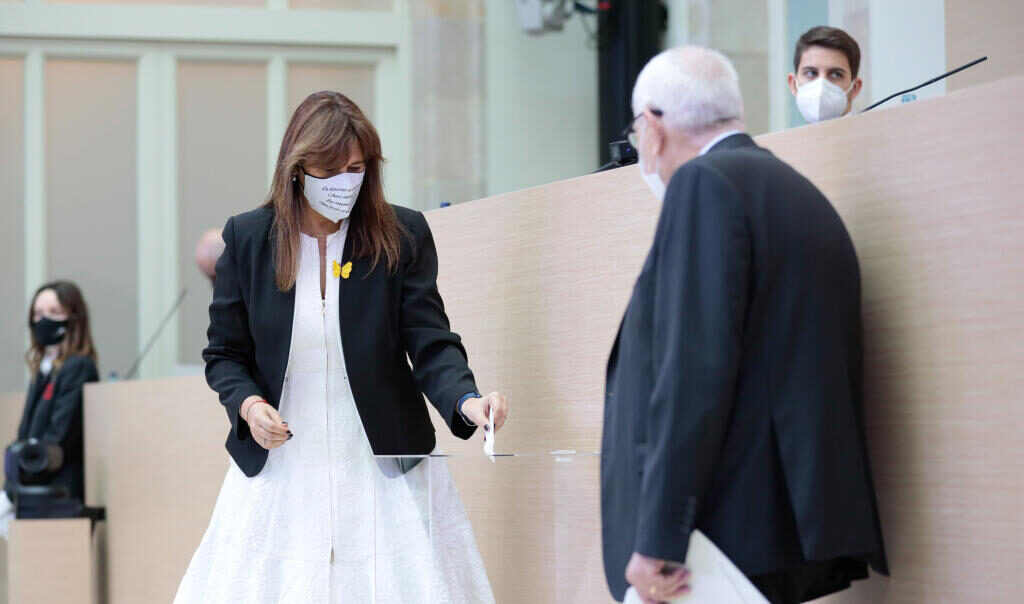12.03.2021 - 11:32
|
Actualització: 12.03.2021 - 12:32
Laura Borràs will be the new Catalan Parliament speaker for the new term that began on Friday, the 13th of the institution since its restoration in 1980. She was elected by 64 votes in favour out of 135, with 50 MPs voting for the Socialist candidate, Eva Granados. The session also included the oath of all 135 new MPs.
Borràs has become the third woman to hold the post after Núria de Gispert and Carme Forcadell – the latter of whom is currently serving a decade-long prison sentence for allowing a referendum bill be passed in parliament in 2017 and for her role in the independence push.
The vote to select the speaker had to be repeated after no candidate garnered a majority of seats – 11 MPs voted far-right Vox’s Maria García Fuster and 8 to left-wing En Comú Podem’s Joan Carles Gallego, while 8 more voted blank in the first vote.
Pro-independence agreement
Borràs will be Catalonia’s second-most important authority in the coming years, as part of an agreement between the two mainstream pro-independence forces, Junts per Catalunya and Esquerra – the pact paves the way for Esquerra’s frontrunner, Pere Aragonès, to become president in the coming weeks.
Yet, far-left CUP, the other pro-independence political force, did not support Borràs and voted blank – if Aragonès wants to become head of government, the anticapitalists have to at least abstain again in the vote on his presidential bid in two weeks.
Political outsider
Over the last four years, Borràs has gone from being a political outsider to rising to stardom as one of the most popular leaders of the independence movement, falling a few thousand votes short of becoming Catalonia’s first woman president in the past election.
In 2013, Borràs became the director of the Institute of Catalan Letters, a post for which she currently faces a corruption investigation for allegedly awarding irregular contracts, and which could lead to her removal from office if found guilty. Borràs quit her post as head of the Institute of Catalan Letters after winning a seat in the Catalan parliament in the December 2017 election.
In her autobiography ‘Daughter of October 1’, Borràs recalls how the unauthorized independence referendum inspired her political awakening in the fall of 2017. She later joined the Junts per Catalunya party, led by exiled president Carles Puigdemont.
Minister of culture
Quim Torra, sworn in as Catalan president in substitution of Puigdemont, appointed Borràs as Minister of Culture, a position that put her in the spotlight. She often outshone Torra as the most charismatic JxCat politician, with the exception of Puigdemont.
Borràs’ unlikely rise to political stardom can be explained in part by the imprisonment and exile of Catalan politicians following the referendum push, which swept away some of the most influential leaders of JxCat and their pro-independence allies Esquerra (ERC).
Running in two elections
In 2019, Borràs stepped down as minister to run in the Spanish election. She improved the party’s previous results and became one of the most vocal voices in support of Catalan independence in Congress, where she often rejected any compromise with Spain’s government and criticized ERC for pursuing dialogue.
When a snap election was called in Catalonia, putting an end to three years of politician infighting between JxCat and ERC, Puigdemont’s party chose Borràs as their presidential candidate. Despite JxCat’s bleak election prospects, Borràs helped the party rise in polls and eventually fell one seat short of a triple tie with Esquerra and the Socialists, who won 33 seats.


